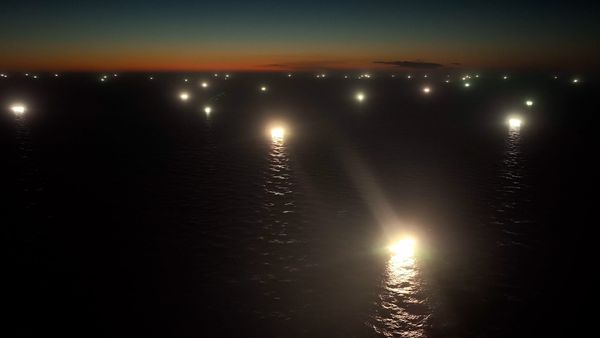
Ian
Urbina
Ian Urbina is the director of The Outlaw Ocean Project, a non-profit journalism organization based in Washington D.C. that produces investigative stories about human rights, environment and labor concerns on the two thirds of the planet covered by water.
Before founding The Outlaw Ocean Project, Urbina spent roughly 17 years as a staff reporter for The New York Times. He has received various journalism awards, including a Pulitzer Prize, two George Polk Awards and an Emmy. Several of his investigations have also been converted into major motion pictures.
Select Publications
![]()
NBC News
The Whistleblower
An American took his dream job in India. What he found was something else entirely.
Read: The Outlaw Ocean Project![]()
The New Yorker
A Fleet Prone to Captive Labor and Plunder
China has expanded an armada of far-flung fishing vessels. And this has come at a grave human toll.
Read: The New YorkerRead: The Outlaw Ocean Project![]()
The New Yorker
The Uyghurs Forced to Process the World’s Fish
China forces minorities from Xinjiang to work in industries around the country. As it turns out, this includes processing much of the seafood sent to America and Europe.
Read: The New YorkerRead: The Outlaw Ocean Project![]()
The New Yorker
The North Koreans Behind Global Seafood
China uses thousands of workers from the Hermit Kingdom, in violation of U.N. sanctions and U.S. law. Many at the plants recounted rampant sexual abuse.
Read: The New YorkerRead: The Outlaw Ocean Project![]()
The New Yorker
Fish Farming is Feeding the Globe. What’s the Cost for Locals?
In the small coastal African country of Gambia, an exploding industry to produce a lucrative high-protein powder called fishmeal has led to big economic promises, and a steep environmental price. Nearly half of all fish pulled from the sea globally is not used for human consumption but instead is ground up, dried and fed as powder or pellets to livestock, most especially farmed fish. This piece explores the surprising way that fish farming - or aquaculture - which was meant to slow the amount of fish being pulled from the ocean has actually accelerated it.
Read: The Outlaw Ocean ProjectRead: The New Yorker![]()
The New York Times Magazine
The Secret Life of Passwords
We despise them – yet we imbue them with our hopes and dreams, our dearest memories, our deepest meanings. Turns out, passwords unlock much more than our accounts. A motivational mantra, a swipe at the boss, a hidden shrine to a lost love, an inside joke with ourselves, a defining emotional scar — many of our most prized passwords are also mental tchotchkes that carry our inner lives forward. Urbina spent 5 years convincing people to tell him their passwords and the rich stories hidden within many of them.
Read: The New York Times![]()
The New York Times
Using Jailed Migrants as a Pool of Cheap Labor
This story revealed that the largest employer of undocumented immigrants in America is the U.S. government. As the federal government cracked down on immigrants where were in the country illegally and penalized businesses that hired them, the federal prison system employs tens of thousands of those same undocumented immigrants each year.
Read: The New York Times![]()
Vanity Fair
Get Kony
This piece is a deep profile of Sam Childers, a former Hell's Angel and gun runner, turned born-again Christian preacher, who joined the guerrilla fighters in South Sudan. Urbina traveled with Childers, after he was ostensibly hired to kill a brutal warlord named Joseph Kony, leader of a group called the Lord's Resistance Army. In 2011, Childers' life story became the basis of a movie called Machine Gun Preacher, starring Gerard Butler.
Read: Vanity Fair![]()
The New York Times
Piles of Dirty Secrets Behind a Model ‘Clean Coal’ Project
This investigation exposed worker safety and financial problems with a 20-billion-dollar project to build a plant in Kemper Mississippi that was supposed to be able to affordably convert coal into natural gas. A huge recipient of tax subsidies, the project was a centerpiece of President Obama’s climate plan even though it was plagued by problems that managers tried to conceal. The published story contributed to a federal investigation and the ultimate dismantling of the plant.
Read: The New York Times![]()
The Atlantic
The Capricious Use of Solitary Confinement Against Detained Immigrants
Based on hundreds of thousands of pages of documents acquired via open-records requests and a whistle-blower, this investigation uncovered how the Obama and Trump administrations used solitary in ways that critics say are arbitrary, cruel, and in violation of federal rules.
Read: The Atlantic![]()
The New Yorker
The Secretive Prisons That Keep Migrants Out of Europe
Hoping to stop migrants arriving from Africa, the E.U. created a shadow immigration system that captures them before they reach its shores, and sends them to brutal Libyan detention centers run by militias. The story was published in more than 50 venues in 11 countries and led to outcry from the UN officials, human rights advocates and parliamentarians. While reporting the piece in Tripoli, Urbina was taken captive and violently abused by a militia.
Read: The Outlaw Ocean ProjectRead: The New Yorker![]()
The New York Times
Drilling Down (A Series)
This 11-part series exposed the environmental, worker safety, and financial risks of fracking, a drilling technique driving the U.S. oil and gas boom. Among its many findings, the series revealed that, with little oversight, oil and gas companies were routinely sending highly radioactive drilling waste to sewage plants that were unequipped to treat it before it was discharged into rivers, sometimes less than a mile upstream from drinking-water intake plants. Municipal authorities were routinely using contaminated drilling waste to de-ice roads in winter and suppress dust in summer, sending millions of gallons of contaminated runoff into rivers. Senior E.P.A. officials bowed to political pressure and blocked research on some of the gas industry’s most hazardous practices. The focus of six Congressional hearings, the reporting also contributed to investigations of the fracking industry by the S.E.C., the New York Attorney General and the G.A.O.. The reporting won an award from The Society for Business Journalists, was the focus of an episode on Stephan Colbert’s show and became the basis for a Matt Damon and John Krasinski movie, Promised Land.
Read: The New York Times![]()
The New York Times
For Youths, a Grim Tour on Magazine Crews
This story investigated so-called “mag crews” – traveling groups of teenagers, many of them runaways or from broken homes, who sell magazine subscriptions. It revealed an otherwise hidden industry prone to debt bondage, drug use and violence. The piece was adapted into the 2016 movie, American Honey, directed by Andrea Arnold and starring Shia LaBeouf.
Read: The New York Times![]()
The New York Times
Panel Suggests Using Inmates in Drug Trials
The piece revealed a proposed federal plan to use prisoners as test subjects for pharmaceutical drug trials, dredging up a painful history of medical mistreatment of inmates. After the story, the proposal was canceled.
Read: The New York Times![]()
The New York Times
In the Treatment of Diabetes, Success Often Does Not Pay
Urbina was a member of the team of reporters that wrote a series about diabetes. Urbina’s story focused on the upside-nature of American health care and how insurance often pays to counter symptoms but not the causes of chronic diseases. The series, called Bad Blood, was a finalist for the Pulitzer Prize and received a public service award from the Society of Professional Journalists’ New York City chapter and a Society of Silurians award for science health reporting.
Read: The New York Times![]()
Harper’s Magazine
Stars and Stripes
This piece revealed that the U.S. Department of Defense uses federal prison inmates, including convicted terrorists, to work in factories producing everything from soldier uniforms and helmets to missile parts and parachutes.
Read: Harper’s Magazine![]()
The New York Times
The Outlaw Ocean (Series)
Seven of the stories in this series about lawlessness at sea were featured on the front page of The New York Times. An eighth piece ran in the New York Times Magazine. The series led to multiple arrests of captains for slavery and murder. It led to litigation against seafood companies and spurred corporate and government policy reforms. It also resulted in Congressional and State Department testimony. The reporting was awarded a half dozen awards and was optioned for film by Leonardo DiCaprio. Eventually it was the basis for a subsequent best-selling book and the founding of a journalism non-profit organization by the same name.
Read: The New York Times![]()
The Atlantic
Purgatory at Sea
Off the coast of Italy, cruise ships are being repurposed as holding pens for migrants rescued from the Mediterranean.
Read: The Outlaw Ocean ProjectRead: The Atlantic![]()
The Washington Post
A Slaughter At Sea, A Grainy Video And Justice Delayed
Among the investigations covered in The Outlaw Ocean book is that of the Murder at Sea story, which reveals a slow-motion slaughter of at least four men caught on camera. The grainy video began circulating in 2013 and the original investigation was published by The Outlaw Ocean in The New York Times in 2015. In late August, 2020, the man shouting on camera and suspected to have ordered these killings was arrested in Taiwan.
Read: The Outlaw Ocean ProjectRead: The Washington Post![]()
NBC News
The Deadly Presence of China’s Invisible Armada
This piece revealed the largest fleet of illegal fishing ships ever discovered: more than 900 Chinese ships in North Korean waters in violation of U.N. sanctions that China had signed. These ships had played a role in desperate North Korean fishermen dying and washing ashore. The story won a Sigma Award and led to meetings at the UN and a sudden withdrawal of these ships.
Read: The Outlaw Ocean ProjectRead: NBC News- More Reporting
Press
![]()
CNN
Amanpour & Co
Ian Urbina speaks with Bianna Golodryga about his reporting for The New Yorker on Libya’s detention centers, the European Union’s alleged complicity, and being detained himself.
Watch Now![]()
MSNBC
All In With Chris Hayes
Ian speaks to Ayman Mohyeldin about the EU-funded Libyan detention system and being taken into captivity while reporting in Tripoli.
Watch on YouTubeLearn More![]()
NPR
All Things Considered
Ian speaks to NPR’s Mary Louise Kelly about his piece in The New Yorker about the EU’s efforts to externalize its southern border to North Africa. He headed into Libya to better understand its role in migrants’ movement toward Europe.
Watch on YouTubeLearn More![]()
European Parliament
Subcommittee on Human Rights
On January 27th, 2022, Ian Urbina testified before the European Parliament’s Subcommittee on Human Rights about E.U. complicity in the brutal detention of migrants in Libyan prisons.
Watch on YouTubeLearn More![]()
Apple News
Apple News Today
Ian Urbina speaks with host Shumita Basu about Libya's EU-funded shadow immigration system, the horrific conditions inside the detention centers, and being detained himself.
Watch on YouTubeListen NowApple News
Apple News Today
Ian Urbina interviewed about The Outlaw Ocean Project's investigation into the European Union's shadow system of secretive migrant prisons in Libya.
Watch on YouTubeListen Now![]()
Remotely Renee
In a recent interview with Remotely Renee, former Democratic presidential candidate Pete Buttigieg reviewed The Outlaw Ocean.
Watch on YouTube- All Press
Awards
George Polk AwardInternational Reporting
Awarded for “The Secretive Prisons That Keep Migrants Out of Europe.” The article revealed that the European Union equipped and trained Libyans to intercept migrants from sub-Saharan Africa at sea and hold them in secret prisons.
2021Learn MoreSigma Delta Chi AwardMagazine Investigative Reporting
Awarded “The Invisible Wall” (published in The New Yorker), “Purgatory at Sea” (published in The Atlantic), and “Fish Farming Is Feeding the Globe. What’s the Cost for Locals?” (published in The New Yorker).
2021Learn MoreJames Foley Medill MedalCourage in Journalism
Awarded for “The Secretive Prisons That Keep Migrants Out of Europe,” an investigation of the European Union’s shadow immigration system that sends migrants to Libyan detention centers before reaching European shores. During their reporting, Ian Urbina and his colleague, a videographer named Pierre Kattar, were captured by Libyan agents, blindfolded and held at a black site for daily interrogations before being rescued. During captivity Urbina was beaten and sustained severe injuries.
2021Learn MoreMichael Kelly Award
Awarded for “The Invisible Wall” published in the December 2021 edition of The New Yorker magazine (published online as “The Secretive Prisons That Keep Migrants Out of Europe”). Sponsored by The Atlantic Magazine, the award is granted to a writer whose work demonstrates a fearless pursuit of truth.
2022Learn MoreAl Neuharth Innovation in Investigative Journalism Award
Awarded for "The Secretive Prisons That Keep Migrants Out of Europe" by the Online Journalism Awards.
2022Learn MoreScripps Howard AwardExcellence in Innovation in Journalism
Awarded for The Outlaw Ocean Music Project. Launched in 2020, this project is a global effort to collaborate with musicians for the purpose of disseminating The Outlaw Ocean Project reporting to a younger and more diverse audience.
2021Learn MoreOverseas Press Club AwardInternational Human Rights Reporting
Granted the Joe and Laurie Dine Award for best international reporting in any medium dealing with human rights, for “The Secretive Prisons That Keep Migrants Out of Europe.”
2021Learn MoreIRE Tom Renner Award
Granted the Investigative Reporters & Editors Tom Renner Award for “The Secretive Prisons That Keep Migrants Out of Europe.”
2021Learn MoreEmmy AwardOutstanding Crime and Justice Coverage
Awarded for “Get Away from the Target”—Rescuing Migrants from the Libyan Coast Guard
2022Learn MoreThe Christopher Dickey AwardJournalism Excellence
Given by FilmAid International for career accomplishment in human rights journalism, this award was presented in a ceremony in New York City by the actor Mark Ruffalo in October 2021.
2021Learn MoreNorth American Digital Media AwardUse of Online Video
Awarded for “Get Away from the Target”—Rescuing Migrants from the Libyan Coast Guard ” a short documentary and part of the investigation “The Secretive Prisons That Keep Migrants Out of Europe.”
2022Learn MorePulitzer PrizeBreaking News Reporting
In April 2009, Urbina was a member of the team of reporters that broke the story about then-New York Governor, Eliot Spitzer and his use of prostitutes.
2009Learn MoreNorth American Digital Media AwardAudience Engagement
Awarded for The Outlaw Ocean Music Project.
2022Learn MorePicture of the Year AwardDocumentary Journalism
Granted for “Unsafe Passage” a short documentary and part of the investigation “The Secretive Prisons That Keep Migrants Out of Europe.”
2021Learn MoreNPPA Best of PhotojournalismShort Form & Documentary of the Year
Received for the documentary “Unsafe Passage.”
2021Learn MoreGeorge Polk AwardForeign Reporting
Granted for excellence in reporting on The Outlaw Ocean.
2016Learn MoreEmmy NominationBest News Coverage—Long Form
Nominated for “Get Away from the Target”—Rescuing Migrants from the Libyan Coast Guard
2022Learn MoreEmmy NominationNews and Documentary
Nominated for “The Secret Life of Passwords.”
2015Learn MoreNational Edward R. Murrow AwardVideo
Given by The Radio Television Digital News Association for video work done tied to The Outlaw Ocean.
2016Learn MoreSigma AwardExcellence in Data Journalism
Granted for a collaboration with NBC News that revealed the world's largest illegal fishing fleet (more than 900 Chinese squid ships in North Korean waters in violation of UN sanctions).
2020Learn MoreThe Peter Benchley Ocean AwardMedia Excellence
Granted for impact and reach of The Outlaw Ocean reporting.
2016Learn MoreThe New York Times Best Seller ListHardcover Nonfiction
The book was added to the NYT Best Seller list for September 2019, within the first month after its publication.
2019Learn MoreBest Books of 2019
Amazon editors ranked the book as among the top ten “must reads” of August.
2019Learn MoreDesmond Wettern Media AwardBest Journalistic Contribution
Awarded by The Maritime Foundation in London in October 2016 for accomplishment in reporting offshore.
2016Learn MoreThe Society of Publishers in Asia AwardExcellence in Digital News
Granted by the Journalism & Media Studies Centre at The University of Hong Kong in July 2016 for accomplishment in international reporting on The Outlaw Ocean.
2016Learn MoreThe Sigma Delta Chi AwardInternational Reporting
Granted by the Society of Professional Journalists in May 2016, this award went to Urbina for foreign reporting.
2016Learn MoreNational Magazine AwardReporting (Finalist)
Granted for “The Secretive Prisons That Keep Migrants Out of Europe.”
2021Learn MoreNorth American Digital Media Award (Finalist)Journalism Project
Granted for “The Secretive Prisons That Keep Migrants Out of Europe.”
2022Learn MoreGerald Loeb Award (Finalist)
Chosen by University of California, Los Angeles in July 2016 for international reporting done for The Outlaw Ocean.
2016Learn MoreScripps Howard Award (Finalist)
Selected by Scripps Howard Foundation's national journalism competition judges in May 2016 in the international category for reporting in The Outlaw Ocean coverage.
2016Learn MoreMichael Kelly Award (Finalist)
Sponsored by The Atlantic Magazine, the award is granted to a writer whose work demonstrates a fearless pursuit of truth. For his Outlaw Ocean reporting, Urbina was a finalist in May 2016.
2016Learn MoreDart Award (Honorable Mention)
Granted for “The Secretive Prisons That Keep Migrants Out of Europe.”
2021Learn MoreTrace International Prizes (Honorable Mention)Investigative Reporting
Granted by Trace in July 2016, a global anti-bribery NGO, for Urbina’s reporting about the dangerous work of maritime repo men who steal or repossess ships on behalf of bank, mortgage lenders, insurers or ship owners.
2016Learn MoreThe Anthony Lewis Prize (Honorable Mention)Exceptional Rule of Law Journalism
The World Justice Project selected The Outlaw Ocean for this award in July 2016.
2016Learn More
Adaptations
The Outlaw Ocean
In 2015, Leonardo DiCaprio and several others collectively bought the scripted and non-scripted rights for The Outlaw Ocean book to produce a documentary series and a scripted feature about Urbina's reporting.
Learn MoreAmerican Honey
A 2007 Times investigation by Urbina about so-called "mag crews" — traveling groups of teenagers, many of them runaways or from broken homes, who sell magazine subscriptions — was adapted into the 2016 movie, American Honey, directed by Andrea Arnold and starring Shia LaBeouf.
Learn MorePromised Land
In interviews, Matt Damon and John Krasinski have said that their 2012 film Promised Land was partly inspired by the Times' investigative series, "Drilling Down."
Learn MoreDeepwater Horizon
In 2011, Urbina’s reporting was part of a story optioned for the film, Deepwater Horizon with Mark Wahlberg.
Machine Gun Preacher
In 2010, Urbina wrote a profile for Vanity Fair magazine on Sam Childers, a former Hell's Angel and gun runner, turned born-again Christian preacher, who joined the guerrilla fighters in South Sudan. Urbina traveled with Childers and a militia in Sudan and the Democratic Republic of Congo, after he was ostensibly hired to kill a brutal warlord named Joseph Kony, leader of a group called the Lord's Resistance Army. In 2011, Childers' life story became the basis of a movie called Machine Gun Preacher, starring Gerard Butler.
Organizations
![]()
The Outlaw Ocean Project
Founded in 2019, The Outlaw Ocean Project, is a non-profit journalism organization based in Washington D.C. that produces investigative stories about human rights, environment and labor concerns on the two thirds of the planet covered by water. This organization’s journalism is distinct not just in its focus, but also in how the reporting is conducted and distributed.
Most of the stories are reported at least partially at sea. In the United States, the non-profit publishes its stories in various news outlets, including the New Yorker, NBC News, The Atlantic and The Washington Post. The reporting is also translated into a half dozen languages and further disseminated abroad in partnership with dozens of foreign newspapers and magazines. To reach a younger and more international audience, the organization leverages non-news platforms, collaborating with artists to convert the reporting into other forms such as music, animation, mural art, stage performance, and podcast. To subscribe to the newsletter, email: media@theoutlawocean.com.
Learn More![]()
The Outlaw Ocean Music Project
Launched in 2020, this project is a global effort to collaborate with musicians for the purpose of disseminating The Outlaw Ocean Project reporting to a younger and more diverse audience. The logic in this tactic is that too often worthy journalism goes unknown because traditional news outlets wait for people to come to their platforms. The music project tries to take this urgent content out to a wider public using non-news platforms like Spotify, Amazon Music and Apple Play.
From classical to hip hop to electronic, hundreds of musicians have joined the effort. The albums they create are emotionally inspired by stories produced by The Outlaw Ocean Project. Many of the artists use recorded readings of the written stories and sound samples from field recordings taken at sea. The music is paired with videos and album art using material shot during the reporting. The albums are then released on dozens of music platforms globally. A portion of the listeners to the music and viewers of the related videos discover the reporting on these non-news platforms and click their way over to the fuller stories to learn more.
The Outlaw Ocean Music Project has been widely covered by NPR, Billboard Magazine, GQ, San Francisco Classical Voice, The Pulitzer Center and elsewhere. To join the project, email media@theoutlawocean.com.
Learn More![]()
The Outlaw Ocean Mural Project
Journalism explains the world. Art makes people feel. In melding the two, our goal is to refocus global attention offshore and to stoke urgency and curiosity about this often-overlooked domain.
Painters from around the globe have come together to render the worry and wonder of what is happening at sea. A vast realm of astounding beauty, the oceans are also a dystopian frontier. They are home to dark inhumanities and dire industrial activities, where everything from murder and slavery to dumping and drilling routinely go unchecked.
Not unlike a literacy campaign, this project uses public art to raise cultural awareness and to offer fluency about the watery two thirds of the planet. The oceans supply 50 percent of the air we breathe. They are a workplace to more than 50 million people. And yet, the journalism about this sprawling and vital place is a rarity.
In their own aesthetic, through imagery that is at once captivating and critical, muralists in dozens of cities internationally have leveraged their talents to amplify the stories we report. Their paintings are meant as an onramp into a set of issues that need attention.
Learn More



























